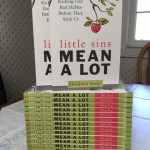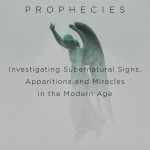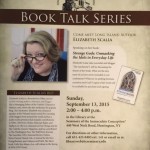The neighborhood where I grew up was a block of “mutts”, and my own family boasted Irish-Italian-English-Scots-German muttage, but if you asked any of us “what are you?” the answer, our answer would have been “Catholic” and our Catholicism precluded all of our other labels, including “American.” Our culture was American, yes, but it was first-and-foremost “Catholic”. We didn’t have a flag hanging out the door, but we had a Saint Jude on the doorstep, and the Sacred Heart of Jesus in the kitchen. While we were not a particularly “holy” bunch — there were no daily communicants among us and when we went to confession of a Saturday we didn’t have to invent any sins — even so our every day was shot-through with Catholicism. It was the central reference of our lives; whether at school or work or play, whatever was happening of a moment could be instantly connected to our faith, whether it be a consciousness of sin, a wide-eyed gasp at a God-created creature or sunset, a lost coin that had us calling “Tony, Tony, look around…”
We were American, yes, but we were Catholic first. Not American-Catholics but Catholics who happened to be Americans. Patriots, yes — all of the men in my family served in the armed forces and political issues were discussed seriously, campaigns were volunteered-for and votes were cast with great pride — but even so, Catholics first.
That has changed, obviously, for most Catholics, and over at his blog, Father Dwight Longenecker is running a very good series that looks at how our changing sense of ourselves — evolved from Catholics in America to American Catholics — is weakening the church and our own faith. He calls it What is Killing American Catholicism?.
From Part I:
I’m all for cultural customs and so forth, but the problem is that the immigrant Catholics–in a foreign land–clung to their culture for security and happiness and part of that culture was their Catholicism. The didn’t distinguish their culture from their Catholicism. Then, after a few generations, when they were all really American and stopped being Italian or Irish or German they also stopped being Catholic. The Catholic faith wasn’t much deeper than Mama’s special spaghetti sauce or stories of the Blarney stone.
Of course they didn’t all stop being Catholic. Something else happened which was even more subtle and insidious. They became Americans and because their mindset was that their Catholic faith was something which blended with their culture, instead of being Italian-Catholics or Polish Catholics they became American Catholics. Just as nationalism and love of culture blended with their Catholic faith when they were ethnic minorities, now it blended seamlessly with their new American culture. Just as Catholicism gave their former culture God’s approval, not their Catholicism gave American values and culture God’s approval.
Thus we have what I call AmChurch: the American Catholic church which is happily and blissfully blended with everything wonderful about America. Except that the “wonderful” values of most Americans are unapologetically materialistic, hedonistic and self centered. Thus at least 50% of American Catholics live like their American neighbors–going to the mall, getting as much stuff as possible, giving as little as possible, having a neat and tidy two children and a double income, and basically smiling their way to success like everyone else.
This is no benign situation. America is certainly a great nation but we Catholics have begun to forget that all nations pass and governments evolve away from their founding ideals, but the church goes on. What Longenecker is talking about is something more and more Catholics are thoughtfully musing on, as does Russell Shaw in his book, American Church: The Remarkable Rise, Meteoric Fall, and Uncertain Future of Catholicism in America which I wrote about here and at First Things:
Shaw argues that the present struggles of the Church to be who she is amid governmental mandates and the ascendant “state religion” of secular humanism are the legacy of Baltimore’s Cardinal James Gibbons and other early churchmen who found America to be so accommodating to religion as to warrant a reciprocal accommodation to nationalism.
Thus was born the notion of American Catholicism—something broader, less provincial than the Irish-Catholic or German-Catholic or Italian-Catholic cultural models—Catholicism, fully assimilated into a new age and era; e pluribus unum, comfortable with new customs and ready to travel with them.
Shaw notes that for a long while, this made sense, and politically, economically, and socially it carried Catholics far. Yet the early Americanization of the Church, writes Shaw, “included not just (as is commonly said) the idea that American-style separation of church and state supplied a model for adoption by the Church everywhere, but also a subjective, individualistic approach to Church doctrine and discipline widely present among American Catholics now.”
That is where Father Dwight appears to be heading as in Part II of his series he begins to sketch out some specifics:
Too many American Catholics have soaked up the materialistic spirit of the American age totally uncritically. They have chosen the way of materialism, hedonism, utilitarianism and consumerism, and this has dulled their commitment to Christ and the gospel. What are all these “ism’s”? Materialism is not simply buying lots of stuff at the mall. It is also a philosophy that the physical world is really all that matters. This translates into an attitude about the church in which all that matters is the good works of feeding the poor and doing peace and justice. While these things are important–to focus on them alone makes the church, (as Pope Francis says) no more than an NGO–just another charity.
You’ll want to keep an eye out for additions to the series — perhaps subscribe to is RSS feed.
I think in this Year of Faith, we do well to ponder the threat to our souls when we too-nearly connect the temporal things of nationalism and ideology to the eternal thing of holiness and religion, or, even worse, when we displace what is of primal importance: the worship of God and our fitness for heaven, with an over-attention to the vagaries and illusions of our ever-passing age.
In fact, someone ought to write a book about that.
Oh, wait… ;-)
UPDATE: Jeff Miller reviews Shaw’s book here
Related:
Exile: The Past is Prologue













